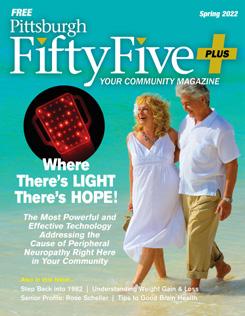




— said no one ever.
At UPMC Senior Communities, we know how to enjoy summer—with activities, fun, and friendship. And the grass is always greener when you don’t have to cut it. Visit one of the UPMC Communities near you and see how true independence can mean more of the things you



Phone: 724 -940

President & Publisher
Laura Lyn Arnold
Publisher Emeritus & Contributor
Marion Swanson Piotrowski
Executive Editor Emily King
Managing Editor/ Public Relations Coordinator
Paula M. Green
Marketing & Account Executives
Mary L. Simpson
Sharon Yezerski
Design & Production
Kostilnik & Assoc. Graphics, Inc.
Web Master
Swanson Publishing, LLC
Contributing Writers
Joseph C. Maroon, MD, FACS
Janice Lane Palko
The mission of the Swanson Publishing, LLC is to connect the people of Pittsburgh by publishing the area’s finest senior publication, Pittsburgh Fifty Five Plus Magazine. The publication is dedicated to the people, communities, educational, religious, travel, health, and recreational needs of seniors in our area. The contents of Pittsburgh Fifty Five Plus Magazine may not be reproduced or copied in whole or in part without written permission from the publisher. Pittsburgh Fifty Five Plus reserves the right to refuse editorial or advertisements that do not meet the standards of this publication. PO
Pittsburgh Fifty Five Plus Magazine is published four times a year by Swanson Publishing, LLC (P.O. Box 425, Mars, PA 16046, 724-940-2444) and is distributed free of charge throughout the Greater Pittsburgh region. Subscription can be purchased from the publisher at $25 for one year.
Rightsizing is more than just downsizing; it's about making your living space work better for a new chapter of your life. These 10 tips will help you make thoughtful decisions during the decluttering process.
Rightsizing is more than just downsizing; it's about making your living space work better for a new chapter of your life. These 10 tips will help you make thoughtful decisions during the decluttering process.
1. START SIMPLE
1. START SIMPLE
Begin decluttering with the easiest decisions. Tackle out-of-sight areas like attics, crawlspaces, and garages first, discarding anything broken or no longer needed. This initial progress will build momentum for the rest of the process.
2. THE "WILL I MISS IT" TEST
Begin decluttering with the easiest decisions. Tackle out-of-sight areas like attics, crawlspaces, and garages first, discarding anything broken or no longer needed. This initial progress will build momentum for the rest of the process.
2. THE "WILL I MISS IT" TEST
Evaluate each item with the question, "If this disappeared tomorrow, would I miss it or rush to replace it?" If the answer is no, it’s time to let it go.
3. RECLAIM YOUR SPACE
Evaluate each item with the question, "If this disappeared tomorrow, would I miss it or rush to replace it?" If the answer is no, it’s time to let it go.
3. RECLAIM YOUR SPACE
Don’t serve as a storage unit for others. If friends or relatives have left items with you, set a deadline for them to pick them up, or offer to donate or ship the items back to them.
4. ASK FOR HELP
Don’t serve as a storage unit for others. If friends or relatives have left items with you, set a deadline for them to pick them up, or offer to donate or ship the items back to them.
4. ASK FOR HELP
Rightsizing can be overwhelming, so enlist help. Whether it’s family, friends, or a professional organizer, additional hands can make the process easier.
5. THE “LIFESTYLE RELEVANCE” TEST
Rightsizing can be overwhelming, so enlist help. Whether it’s family, friends, or a professional organizer, additional hands can make the process easier.
5. THE “LIFESTYLE RELEVANCE” TEST
Look for items in your home that no longer fit your current lifestyle. Do you still need that badminton set or the crib you kept in the spare room for grandkids that are now grown?
6. PRIORITIZE WHAT MATTERS
Look for items in your home that no longer fit your current lifestyle. Do you still need that badminton set or the crib you kept in the spare room for grandkids that are now grown?
6. PRIORITIZE WHAT MATTERS
Imagine moving overseas and you can only take a certain number of items with you. What would make the cut? Focus on retaining the items that are truly valuable to you.
Imagine moving overseas and you can only take a certain number of items with you. What would make the cut? Focus on retaining the items that are truly valuable to you.

7. SCHEDULE REGULAR SESSIONS

7. SCHEDULE REGULAR SESSIONS
Dedicate regular time each week to continue the rightsizing process. Treat it like a marathon, not a sprint; it takes time to sort through years of accumulated items.
8. CHERISH WHAT YOU KEEP
Dedicate regular time each week to continue the rightsizing process. Treat it like a marathon, not a sprint; it takes time to sort through years of accumulated items.
8. CHERISH WHAT YOU KEEP
The fewer possessions you hold onto, the more you’ll value and enjoy them. Retain only those possessions that genuinely enrich your life and bring you joy.
9. REQUEST MEMORIES RATHER THAN MATERIAL GIFTS:
The fewer possessions you hold onto, the more you’ll value and enjoy them. Retain only those possessions that genuinely enrich your life and bring you joy.
9. REQUEST MEMORIES RATHER THAN MATERIAL GIFTS:
To avoid accumulating items during holidays and birthdays, encourage loved ones to give experiences that foster memorable moments instead of material gifts.
10. PASS IT TO THE NEXT GENERATION
To avoid accumulating items during holidays and birthdays, encourage loved ones to give experiences that foster memorable moments instead of material gifts.
10. PASS IT TO THE NEXT GENERATION
Use this opportunity to hand down heirlooms or special items to family members. Capture these moments with photographs to create a digital scrapbook.
Use this opportunity to hand down heirlooms or special items to family members. Capture these moments with photographs to create a digital scrapbook.
"I'm Your SRES®"
Add contact information here

Your SRES®" contact information here Deb Walton, SRES®



The Center for REALTOR® Development (CRD) confers the Seniors Real Estate Specialist® (SRES®) designation, which is an official credential of the National Association of REALTORS® (NAR).


When it comes to solving spine issues, the more specialists the better — especially when they bring di erent skill sets, experiences, and points of view. That’s why the orthopaedic and neurosurgeons at AHN Wexford Hospital work together as one unified team. Neurosurgeons train in surgery for the entire nerve system, including the brain and spine, while orthopaedic surgeons are experts in the workings of the musculoskeletal system and specialize in the spine.
“The skills emphasized are fundamentally di erent, but the two are synergistic and together help optimize care,” said Ryan Sauber, MD, AHN Orthopaedic Surgery. This multidisciplinary approach brings greater expertise and creative problem-solving skills to the table.
“You’re not just getting one set of eyes or one opinion,” said Benjamin Whiting, MD, AHN Neurosurgery. “Your care is discussed among multiple specialists who work with you to achieve the best possible outcomes. Being able to bounce things o each other, perform procedures together, and learn from each other is a huge benefit to us and our patients.”
This collaborative approach also helps lead innovation. “Our spine research lab is very busy. Many of our surgeons are publishing papers and leading clinical trials,” said Dr. Sauber. “We were one of the first centers in the region to invest in robotic and endoscopic technologies that let us perform more complex procedures in minimally invasive ways.”
Together, AHN orthopaedic surgeons and neurosurgeons developed a standardized same-day spine surgery protocol to safely allow patients to go home the day of their procedure. “The protocol involves how we do the procedures, the pain medicines we give during and after, and how we monitor recovery.” The protocol also involves nurse navigators who coordinate everything from pre-surgery testing and imaging to post-surgical follow-up care and occupational physical therapy.
If you or a loved one is diagnosed with a spine condition or experiences a herniated disc, count on the growing team at AHN Wexford to arrive at the right plan for you.
“Working together with access to the latest in robotic and endoscopic technology helps us provide patients with the new standard, close to home,” said Katherine Berry, AHN Neurosurgeon.

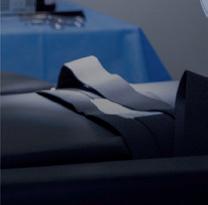





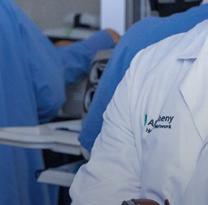



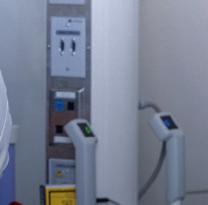




The experienced surgeons at AHN Wexford Hospital are committed to treating each patient with the least invasive spine procedures possible. That means trying nonsurgical treatments first. But if you need surgery, we o er procedures using the most advanced technologies — including the revolutionary new Arthrex® Endoscopic Spine System for spinal decompression surgery.
It utilizes state-of-the-art camera technology to provide ultra-high-definition video from within the spinal canal, eliminating the need for large incisions.
“We can make a small opening to insert an endoscope and microsurgical tools to address the condition,” said Ryan Sauber, MD, AHN Orthopaedic Surgery. “Plus, it a ords us more direct access to the problem site so we can go precisely where the disc is pressing on the nerve.” The result is shorter procedure times, less bleeding and pain, and a faster recovery.
“The Arthrex® is a wonderful addition to our toolkit,” said Dr. Sauber. “When we can do more with less impact, it’s always a win.”



Our neurosurgeons and orthopaedic surgeons work together to provide comprehensive and personalized spine treatment for a range of disorders. Meet a few members of our spine surgery team:



Ryan Sauber, MD, AHN Orthopaedic Surgery
Dr. Sauber treats a variety of adult and pediatric spine conditions including scoliosis, adult cervical and lumbar degenerative diseases, spinal trauma, and tumors. “Taking people who are in debilitating pain and returning them to normal lives quickly is very rewarding,” he said.
Benjamin Whiting, MD, AHN Neurosurgery
Dr. Whiting recently finished a complex spine fellowship at Cleveland Clinic, where he learned the full breadth of spine pathology and treatment. He’s excited to be practicing at AHN Wexford in his hometown. “Being back here to help the people I grew up with is a dream come true,” he said.
Katherine Berry, MD, AHN Neurosurgery
Dr. Berry recently joined the AHN team after completing her residency at the University of Miami. “I’m excited to be part of such a collaborative, growing team,” she said. “The leadership at AHN is committed to making Wexford the go-to spine center for the new standard of care. It’s exciting to be part of that.”
Call (412) DOCTORS (362-8677) to schedule an appointment with a spine specialist.

By Joseph C. Maroon, MD, FACS
From a recent survey, 50% of U.S. adults say it is difficult to afford health care costs, and 25% say they or a family member in their household had problems paying for health care in the past 12 months. Younger adults, those with lower incomes, adults in fair or poor health, and the uninsured are particularly likely to report problems affording health care in the past year. In addition, 25% of adults say that in the past 12 months they have skipped or postponed getting the healthcare they needed because of the cost.
One reason cited for the high cost is that our system provides Americans with the most advanced technologies and best health outcomes compared to the rest of the world. Unfortunately, this is not completely true. The US ranks last in overall health system performance, despite spending the most on healthcare. In 2022, the U.S. spent approximately $12,742 per person on healthcare. This figure is the highest among similar countries, and despite this high spending, healthcare utilization rates in the U.S. do not differ significantly from those in other similar wealthy countries. Factors like lower life expectancy, higher rates of avoidable deaths, and challenges with access and equity mean for many people adequate healthcare is not being provided.
So, why are US healthcare costs so high? Answering this question is complicated but in a large part it is due to two major factors. First, going back to the rules of economics, currently in the US, the more services that are provided by a healthcare system, the more profit they made. This is true for both profit and nonprofit organizations. The second major cost driver is the loss of healthcare provider competition in many areas (mostly rural). This allows local healthcare monopolies that can dictate what every price for services they want.
The United States is the only developed country without some form of universal
healthcare coverage. This means that, unlike the US, most developed countries have systems in place to ensure that all residents have access to necessary medical care, often through government-funded or mandatory insurance programs. Although this topic is controversial, the fact is the government would have the ability to control most healthcare costs. This could eliminate or reduce the extreme profit some health systems make and reduce cost to the public.
In the US, less than 3% of total healthcare spending is allocated to preventive care. This branch of medicine focuses on preventing diseases and promoting health before disease occurs. Despite this small percentage, it’s estimated that 75% of ongoing healthcare costs are related to preventable conditions like obesity, type 2 diabetes and tobacco use. Shifting priorities to prevent disease has been and will continue to be the best way to reduce costs and maintain a higher quality and quantity of life. Below is a list of some better choices you can make that can make a huge for your future health.
• Make better health choices – avoid sick care – Lower stress, lose weight, don’t smoke or use avoid excessive alcohol use a seat belt slow down, eat health and exercise regularly
• See you PCP annually – Participant in disease screening – Skin exam, breast prostate exam, etc
• Report symptom changes early, report all adverse drug effects
• Take medications as prescribed
• Minimize fall risk
• Use a Health Savings Account (HSA) to have money for co-pays that will not be taxed
• Consider Medical Advantage – But realize there are preauthorization to meds and tests
• You also need to use In-Network Health Care Providers
• Don’t neglect dental and vision care
• Use generic Medication if possible n
Clinical information is provided for educational purposes and not as a medical or professional service. Person(s) who are not medical professionals should have clinical information reviewed and interpreted or applied only by the appropriate health professional(s).
Joseph C. Maroon, MD, FACS, is a board-certified neurosurgeon with more than 40 years of clinical experience at the University of Pittsburgh Medical Center. He ia a neurosurgeon consultant for the Pittsburgh Steelers. Dr. Maroon is an expert and consultant in the areas of wellness, sports nutrition, concussion management, and brain and spinal problems. He is an internationally competing Ironman triathlete.




As we age, managing chronic health conditions becomes important for maintaining quality of life and independence. Chronic health issues like diabetes, heart disease, arthritis, and high blood pressure are common among older adults. However, with the right strategies, individuals can manage these conditions effectively and enjoy a fulfilling life.
Chronic health conditions are long-term health problems that need ongoing care and management. They often affect daily activities and overall well-being. Understanding your specific condition, its symptoms, and treatment options is the first step in effective management.
Frequent visits to your health care provider are crucial for monitoring chronic conditions. Regular checkups help detect any changes in your health early, allowing timely interventions. Keep a record of your medical history and medications and share any new symptoms with your doctor.
Properly managing medications is vital for controlling chronic health conditions. Follow prescribed dosages and schedules and use pill organizers to keep track of your medications. Consult your health care provider before making any changes to your medication plan.
A balanced diet is important for managing chronic health conditions. Eat nutrient-rich foods such as fruits, vegetables, lean proteins, and whole grains. Limit processed foods, sugars, and sodium. Consider working with a nutritionist to create a diet plan tailored to your specific health needs.
Regular physical activity can improve overall health and help manage chronic conditions. Choose exercises that suit your fitness level and interests. Walking, swimming, yoga, and strength training are excellent options. Aim for at least 30 minutes of moderate exercise most days of the week.
Mental health is just as important as physical health. Chronic conditions can cause stress, anxiety, and depression. Practice mindfulness, meditation, and deep breathing exercises. Stay connected with family and friends and consider joining support groups or seeking professional counseling if needed.
Tracking your health metrics is essential for managing chronic health issues. Use devices like blood pressure monitors, glucometers, and fitness trackers to monitor your condition daily. Recording your results can help you and your health care provider make informed decisions about your treatment plan.
Learn about your chronic condition. Understand the symptoms, triggers, and treatment options available. Stay updated with the latest research and advancements in your condition. Knowledge empowers you to make informed choices about your health.
Managing chronic health conditions can be stressful. Developing effective stress management techniques can improve your quality of life. Practice relaxation techniques such as reading, listening to music, or engaging in hobbies. Physical activities like gardening and walking can also reduce stress levels.
A strong social support network is beneficial for managing chronic health conditions. Engage with community groups and organizations that offer resources and companionship. Sharing experiences with others who understand your journey can provide emotional support and practical advice.
Modify your living environment to accommodate your health needs. Ensure your home is safe and accessible, with features like grab bars in the bathroom, proper lighting, and clutter-free spaces. Assistive devices like walkers or stair lifts can enhance your mobility and independence.
Be prepared for medical emergencies. Keep a list of emergency contacts, including your healthcare provider, family members, and neighbors. Have a plan for accessing medical services quickly and ensure that your home is equipped with necessary medical supplies.
Preventive care can reduce the risk of complications associated with chronic conditions. Stay up to date with vaccinations, screenings, and routine tests. Flu shots, mammograms, and colonoscopies are examples of preventive measures that can help in early detection and prevention.
Work with your health care provider to develop a personalized care plan. This plan should address your specific health needs, preferences, and lifestyle. It may include medication schedules, dietary recommendations, exercise routines, and selfmonitoring practices.
Managing chronic health conditions requires dedication, knowledge, and support. By implementing these strategies, we can manage their health effectively and maintain a high quality of life. Remember, you are not alone on this journey. Reach out to health care providers, support groups, and community resources to help you navigate your path to wellness.
For more information, visit https://upmc.com/services/ seniors/. n
The University of Pittsburgh’s Pittsburgh Regional Dementia Caregiver Training and Employment Program was awarded a grant through the Henry L. Hillman Foundation as a part of its Healthy Aging Challenge. In partnership UPMC Senior Services, free training sessions for family caregivers, professionals, and intergenerational champions provide new ways of interacting and supporting individuals living with dementia. If you would like to learn more about this opportunity, please reach out to Education and Consultative Services of UPMC Senior Services at 866-430-8742 or UPMCSeniorServices@UPMC.edu.

Being a good neighbor means being there for my community. As your local State Farm® agent, I'm ready to help whenever you need me. Give me a call.
Piotrowski Insurance Agcy Inc
Pete Piotrowski, Agent 11565 Perry HWY, Suite 4
Bus: 724-935-6330
pete@petesinsurance.com www.petesinsurance.com
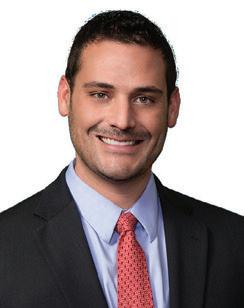


By Ron Eichner

Hey folks, June is truly an action-packed month full of events: schools are silent and summer break is in full swing. June 11 is the month’s full moon, June 14 is Flag Day, and June 15 is Father’s Day, giving us a chance to celebrate and honor the men who have embraced the essential role of fatherhood. On this day, we also thank fathers, uncles, and grandfathers for their sacrifices, for embracing the responsibility of nurturing and raising children, and for their devotion to their families. June 20 in the northern hemisphere is the summer solstice, the day with the most daylight and the first day of summer. June 25 is one of our new holidays, Summer Christmas, six months before Christmas and six months after. Like the area’s illumination for Christmas, Summer Christmas is a time to cluster in some colorful flowers and give your yard a colorful drive-by. June 29 is the halfway point between planting and harvesting in the growing season.
June is also National Dairy Month, a time to recognize the work of our dairy farmers and their supporting families across our commonwealth and our nation. Dairy farming entails milking cows twice a day and all of the care needed to provide for the calves and cows.
For years the experts had cautioned against eating eggs and consuming raw milk. The first food pyramid was introduced in 1974 in Sweden and the U.S. issued their first in 1992. Before that people ate more whole, natural foods, and less junk. Since the introduction of the food pyramid, the obesity rates in the country have soared. The push for a lowfat, high-carb diet put our country on a misdirected course that didn’t support a good balance for health. The FDA sought to rectify some of this on December 19, 2024, when they announced you can honestly say two words in the same promotions, “eggs are healthy.” Also, the American Heart Association has since stated that eggs are not the food con-
tributors to cholesterol and heart disease.
To date, the experts are still against consuming raw, unpasteurized milk. The government agencies caution against it because unpasteurized milk can contain pathogens, but while the pasteurization process kills those pathogens, entities such as The Raw Milk Institute claim that it also destroys some of the beneficial nutrients found in raw milk.
Raw dairy is produced, processed, and distributed using sanitary farming practices to prevent contamination, dairy herd, health management, hygienic milking, and distribution, closed mechanical milking system, rapid cooling, and quality controls with regular, frequent microbial testing. In that case, you have wholesome, nutritional milk that can be safely offered raw or pasteurized if the dairy chooses to do so.
Currently selling raw milk is unlawful in only four states. In Pennsylvania, selling raw milk is legal but producers must have a permit and follow a strict process for both pasteurized

and unpasteurized products.
According to a University of Delaware study in 2024, “most U.S. dairy cows are found on farms with more than 1,000 animals, a stark contrast to 30 years ago when small herds of around 80 cows were more common, according to the U.S. Department of Agriculture’s Economic Research Service (USDA-ERS) estimates.”
For some family farm history, our farm had dairy cows, and pre-refrigeration of our milk was kept cold in our spring house like most farms. When refrigeration came along, it was a significant advancement for all food safety. However, in the 1900s, dairy farms cut corners, and milk had issues safeguarding the public. Pasteurization solved the problem of cleaning up the milk from farms for public consumption. Decades later, when pasteurization was mandated and farms could only sell pasteurized milk, many farms like ours were banned from selling raw milk as we had done safely for decades.
With the movement toward more locally produced goods, will unpasteurized milk find favor again with the experts like eggs have?
The demand for raw dairy is growing, which may be what small family dairy farms need to increase their muchneeded dairy sales.
June is when area gardens and farm fields come to life. Our greenhouses have a nice selection of annuals, hanging baskets, herbs, vegetable plants, potting soil, and peat moss. If you have kids or grandkids, our lambs and cows have delivered baby lambs and calves for you all to see.
Our family farm wants to wish all the dads, granddads, and uncles a blessed, happy Father’s Day. We are nestled in a valley, and our farm market and greenhouses are open seven days a week. We welcome you all to come and visit Eichner’s Whole Farm and Greenhouses at 285 Richard Road in Wexford, experience farm fresh, and discover “the rest of the story.” n
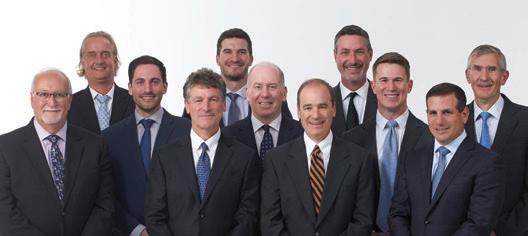



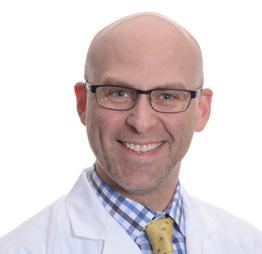
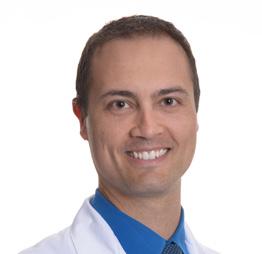
As we age, healthcare becomes increasingly complex, requiring coordinated efforts to manage chronic conditions, preventive screenings, and overall well-being. Having a trusted primary care physician (PCP) is crucial for navigating these changes and maintaining quality of life. PCPs serve as the central point of contact for patients, ensuring continuity of care and facilitating collaboration with specialists, therapists, and other healthcare providers.
Studies show that adults who maintain a strong relationship with a PCP are less likely to experience hospitalizations and are more likely to adhere to preventive care recommendations1 Grob, Scheri, Woodburn & Griffin Family Medicine, part of Genesis Medical Associates, is dedicated to providing this essential support, particularly for the 55+ population.
With two locations (1140 Perry Highway, Pittsburgh, PA 15237, and 4001 Stonewood Drive, Suite 200, Wexford, PA 15090) Grob, Scheri, Woodburn & Griffin Family Medicine ensures patients have access to high-quality care in convenient settings.
The new Wexford location is thoughtfully designed to enhance patient comfort and accessibility. Featuring adjacent parking, wheelchair-friendly entrances, and a spacious secondfloor suite, the office accommodates the mobility needs of older adults while providing a welcoming environment.
Both locations are well-integrated into the Genesis Medical Associates network, which includes access to gynecology, cardiology, pharmacy services, and on-site lab work. This comprehensive approach simplifies healthcare by ensuring seamless coordination of services, reducing the stress often associated with managing multiple providers.
Genesis Medical Associates, Inc., stands out as the only independent medical group in Pittsburgh, with Grob, Scheri, Woodburn & Griffin Family Medicine being one of its distinguished practices. Every physician within this group has been recognized as a Castle Connolly Top Doctor, underscoring their dedication to excellence and innovation in patient care. Patients can trust they are receiving care from providers who are leaders in their field, committed to advancing medical practices and delivering exceptional healthcare.
The practice is deeply attuned to the unique challenges faced by older adults. Chronic conditions such as hypertension, diabetes, arthritis, and heart disease are prevalent among the 55+ demographic, often requiring specialized management strategies.
To support patients in managing these conditions, the practice employs a dedicated Chronic Care Management team. This team collaborates with patients to develop personalized care plans, ensuring that every aspect of their health is addressed. By taking a proactive approach, the team helps patients achieve better outcomes and improved quality of life.
Medication affordability is another critical concern for older adults. The Genesis Medical Associates Pharmacy team assists patients in accessing cost-saving programs, enabling them to adhere to prescribed treatments without undue financial strain.
Preventive care plays a vital role in maintaining health and preventing serious illnesses. Regular wellness exams, routine bloodwork, and screenings for conditions such as colon cancer and breast cancer are essential for early detection and intervention.
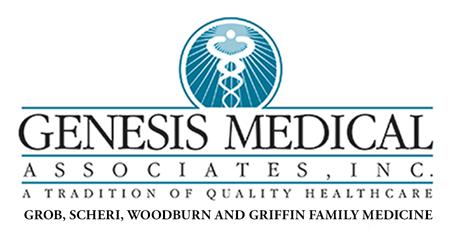
For patients 55 and older, the annual wellness exam is particularly important. During these visits, providers assess overall health, review medications, and discuss lifestyle changes that can promote long-term well-being. By fostering strong, ongoing relationships with their patients, the team at Grob, Scheri, Woodburn & Griffin Family Medicine ensures that care plans are tailored to individual needs.
The practice understands that older adults may feel apprehensive about seeking care, whether due to past experiences or concerns about the healthcare process. To address this, they prioritize creating a supportive and welcoming environment.
The team emphasizes open communication, encouraging patients to voice their concerns and actively participate in their healthcare decisions. Strong relationships between providers and patients form the foundation of effective care, ensuring that each individual feels heard and valued.
For those seeking a new provider, the practice advises finding a team that fosters trust and makes patients feel comfortable discussing their health. The ability to build a strong rapport with your healthcare provider is key to achieving optimal health outcomes.
As individuals age, their healthcare needs evolve. Grob, Scheri, Woodburn & Griffin Family Medicine is well-equipped to address aging-related issues, from mobility challenges to managing multiple medications.
The team collaborates with trusted specialists in the area to ensure that patients receive comprehensive care. Whether coordinating with physical therapists, cardiologists, or home care providers, the practice prioritizes seamless communication among all members of a patient’s healthcare team.
Additionally, they provide referrals to community resources and support services, ensuring that older patients have access to the tools they need to maintain independence and quality of life.
For individuals who may be dissatisfied with their current healthcare provider, switching to a new practice can significantly improve their overall experience and outcomes. The team at Grob, Scheri, Woodburn & Griffin Family Medicine encourages patients to evaluate whether their current provider meets their needs. Factors such as communication, office atmosphere, and responsiveness are crucial to building a trusting relationship.
For those considering a change, the practice is ready to welcome new patients and guide them through the transition process. Establishing a strong partnership with a new PCP can make all the difference in achieving health goals.
• Adults with strong PCP relationships experience a 19% reduction in preventable hospitalizations2 .
• Preventive care, such as annual wellness exams, lowers the risk of undiagnosed conditions, which can significantly impact long-term health 3 .
• Chronic diseases account for 85% of healthcare costs in older adults, highlighting the importance of coordinated care 4 .
Take the first step toward better health by scheduling an appointment today!
Regular follow-ups and maintaining an ongoing dialogue with your healthcare provider are essential components of effective care. Grob, Scheri, Woodburn & Griffin Family Medicine emphasizes the importance of staying connected to your PCP, particularly for managing chronic conditions and navigating aging-related health concerns.
The practice uses a team-based approach to ensure that patients receive comprehensive, personalized care. By fostering strong relationships with area healthcare providers, they can make timely referrals and coordinate care for complex medical needs.
Grob, Scheri, Woodburn & Griffin Family Medicine is dedicated to helping patients achieve optimal health at every stage of life. With two convenient locations, an integrated network of services, and a commitment to excellence, the practice offers unparalleled support for the 55+ community.
For more information or to schedule an appointment, contact:
Pittsburgh Office: 1140 Perry Highway, Pittsburgh, PA 15237
New Office Now Open: 4001 Stonewood Drive, Suite 200, Wexford, PA 15090
Phone: (724) 935-5330
Website: Genesis Medical Associates
Citations:
1 “The Importance of Primary Care in Aging,” Journal of Geriatric Medicine, 2022.
2 CDC National Center for Health Statistics, 2023.
3 American Cancer Society, 2023.
4 National Council on Aging, 2023.

By Crystal Manning and Dvonya Sedlacko-Stephens
The first thing many people will tell you about health insurance is that it’s complicated. Between public and private plans, HMOs, PPOs, and high deductibles, it can be hard to know which plan is right for you.
It has been reported that about half (51%) of insured adults report some difficulty understanding at least
Medicare is confusing – call for a one-to-one, no charge consultation with a Medicare expert!
Remove the FEAR, UNCERTAINTY, AND COSTLY MISTAKES from the Medicare enrollment process.
Crystal A. Manning
Dvonya
Sedlacko-Stephens
Medicare Advisors

Call Crystal: 412-716-4942 or Dvonya: 412-657-3889
email : crystalmanning33@gmail.com
one aspect of their health insurance, including what insurance covers, out-ofpocket costs, and benefit explanations. That’s where brokers come in. Brokers explain health insurance plans to consumers and help them decide which plans work best for them. Healthcare is not one-size-fits-all. Therefore, potential enrollees need to consider their own personal needs and preferences. Patients may have questions about monthly payments, out-of-pocket costs, and in-network providers, for example.
That’s where brokers come in. Brokers explain health insurance plans to consumers and help them decide which plans work best for them. Healthcare is not one-size-fits-all. Therefore, potential enrollees need to consider their own personal needs and preferences. Patients may have questions about monthly payments, out-of-pocket costs, and in-network providers, for example.
But brokers have become a hot topic in healthcare lately, particularly due to lawsuits over alleged kickbacks. The Department of Justice is currently suing large Medicare providers, accusing them of paying millions to brokers in exchange for directing patients toward plans that would give insurers the most money.
Though commonly confused, sales agents and brokers have different employment models, though both are required to have a license to operate in their state.
Brokers work with different health plan providers – typically insurance companies - to find potential enrollees in their area and share several options based on the patients’ needs. Typically, independent brokers are paid by the insurance companies they represent, with no extra fee or cost to you for enrolling in Medicare through a broker.
Sales agents, however, are employed by one health plan provider, either public or private, and try to sell that company’s plans to patients. Sales agents often work on commission, though payment models vary based on where the employee works.
Brokers have seen changes in policies over the past 15 years from various presidential administrations, and these have changed how they approach their jobs. With many more changes coming in the fall, it is more important than ever to trust your broker to assist you in making the right plan choice for you.
For one, the implementation of the Affordable Care Act (ACA), which former President Barack Obama signed into law on May 23, 2010, and the creation of the ACA marketplace, which opened on October 1, 2013, created a lot of uncertainty and confusion.
The introduction of Medicare Part D in 2006, which implemented coverage of outpatient medications, was another major shift. This was compounded by additional changes codified in the 2022 Inflation Reduction Act that added an out-of-pocket spending cap and drug discounts for patients on Medicaid.
Former President Joe Biden also limited broker access to healthcare.gov to prevent plan changes without patient consent. Under the Biden administration, the Centers for Medicare and Medicaid Services (CMS) also finalized new rules in January to penalize brokers who changed plans without patients’ knowledge.
The Medicare process can be overwhelming. A licensed Medicare broker will listen to you and give you information about your coverage options that is based on your needs and preferences. Working with a trained broker can help you save time and money, ultimately helping you find the right plan.
Crystal Manning has been a licensed Medicare Advisor for over 25 years and is authorized to present Medicare options in 10 states. Contact her at (412) 716-4942 or crystalmanning33@ gmail.com and her daughter Dvonya Sedlacko-Stephens at (412) 657-3889 or djsedlacko@gmail.com. n

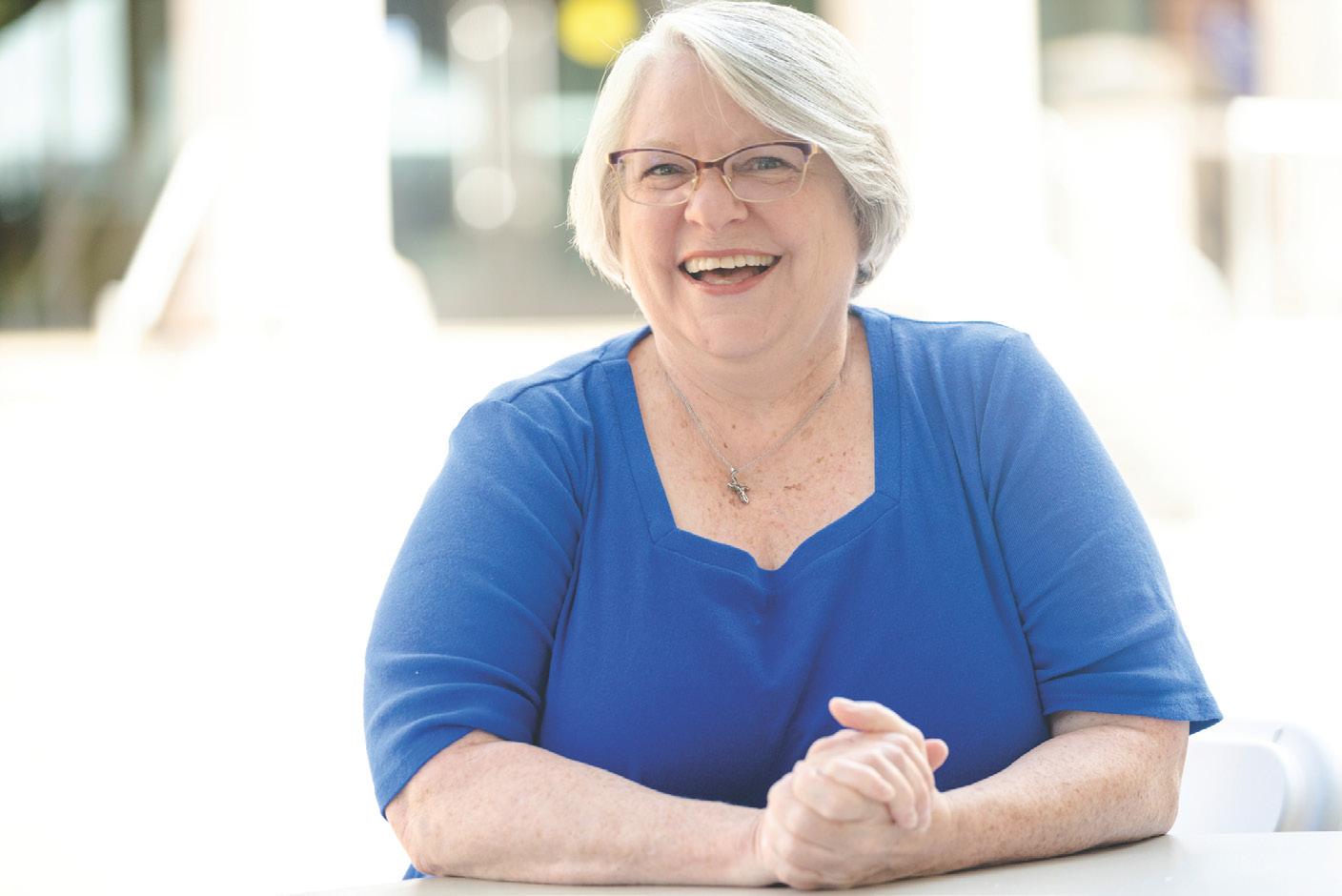

Pittsburgh Seminary students are grounded in faith and formed in community for leadership in their neighborhoods and beyond. Our diverse student body engages in scholarship to stimulate their imaginations They lead with integrity and use their knowledge to change the world with a Christ-like heart Earn your master’s degree or certificate in-person or online. Generous financial aid available! APPLY NOW


By Janice Lane Palko
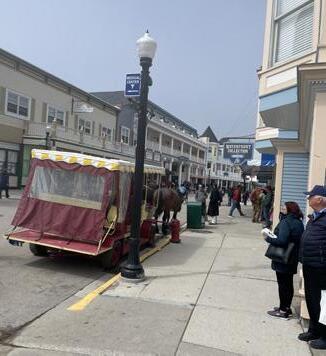
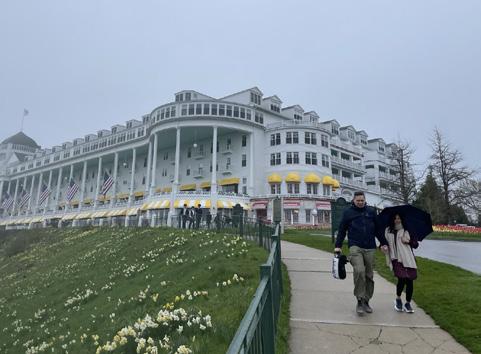
Wanting to avoid the hassle of air travel and having not been on a road trip in a while, for my husband’s 70th birthday, we decided to celebrate by taking a trip to Mackinac Island, Michigan. This is a popular destination for many tour companies in our area, and several family members who had been there recommended the destination for a short trip.
If you envision the lower peninsula of Michigan as an oven mitt, Mackinac Island sits in the Straits of Mackinac at the top of the mitt. The straits connect Lake Michigan to Lake Huron and separate the lower peninsula from the upper. It’s about 530 miles from Pittsburgh, and the small island is only reached by ferry. There are no motor vehicles on the island; the primary means of transportation are horsedrawn carriages or bicycles. The island is only open for the summer.
We went early in the season from May 14-18, and this part of Michigan is about as far north as Montreal; therefore, it seemed as if spring was only starting to arrive there. I had never been to Michigan before, and I was shocked that once you drive past Saginaw, the state is quite desolate. It reminded me of Alaska.
On the way up, we stopped overnight in Frankenmuth, Michigan, which is billed as “Little Bavaria.” It is noted for its quaint German architecture, restaurants, and the famous Bronner’s Christmas Wonderland, the world’s largest Christmas store. However, the birthday boy was disappointed as he had hoped to have a celebratory beer

at the Frankenmuth Brewery, Michigan’s oldest brewery, but alas it was not open the Wednesday night that we arrived.
The next day we headed for Mackinac City and arrived at Shepler’s Ferry that afternoon to find that a plague of insects had taken over the docks. They covered everything and everyone. Shepler’s runs like a well-oiled machine, loading passengers, their luggage, and bicycles and shuttling visitors over to the island in 16 minutes. The ride over affords tourists a view of the “Mighty Mac” bridge which connect the lower peninsula of Michigan to the upper one.
Fortunately, the insects weren’t swarming on the island when we arrived. The ferry dropped us in the middle of town, and it was a bit disorienting to walk out on to a main street that looks like it came from the 1800s, with horses clip-clopping by and luggage handlers loading their bicycles with suitcases like a game of Samsonite Jenga to deliver the bags to the hotels.
That day we just walked the town, which is also famous for its fudge, (there are seven shops selling fudge in four blocks) and had dinner at The Great Turtle, which is what Mackinac means. The Native Americans likened the island to a big turtle in the lake.
On Friday, the weather was warm and sunny. We took a horse-drawn carriage tour of the island, where we saw the Michigan governor’s summer residence, Fort Mackinac, the Bark Chapel—the place where the French Catholic missionaries first held Mass—and the historic Grand Hotel.
After lunch, we rented bikes and cycled the 8.2 miles of shoreline around the island. The trail was flat, and the water was Caribbean-clear and sparkling. Now, I know why Michigan’s motto is “Pure Michigan.” The water was that crystalline.
On Saturday, the weather changed, and it dropped into the 50s and was windy and rainy. We walked to the Grand Hotel, which was the setting for the 1980 movie Somewhere in Time that starred the late Christopher Reeve and Jane Seymour. We dined at the extensive Grand Buffet that featured build-your-own pecan balls, which were—you guessed—it dipped in Mackinac fudge. The hotel boasts the world’s longest porch. Unfortunately, it was too inclement to sit on the rockers and gaze out at the lake. After Mass at St. Anne’s Church, we had dinner at Patrick Doud’s Irish Pub. My husband sampled the fried Michigan whitefish, which he said was delicious.
On Sunday, we caught the first ferry off the island and headed back to Pittsburgh. We thoroughly enjoyed our trip back in time, and I kind of miss not hearing the horse hooves on the pavement outside our window. They set the tone for a relaxing visit.
Mackinac Island has fudge, restaurants, recreation, history, and horses. If I ever went back again, I would go a bit later in the season. Ideally, the Lilac Festival in June would be best, as I love the smell of lilacs and the island boasts over 60 different varieties.
The drive is primarily interstate, and it is worth the trek to step back in time. n


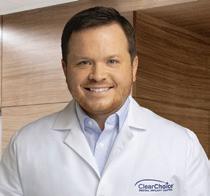
Emily King
According to Albert Einstein, “Wisdom is not a product of schooling, but of the lifelong attempt to acquire it.” If you’re not into physics, don’t worry, he was talking about much more than the theory of relativity. Learning of any kind, whether it’s a foreign language, new craft, or a course on war history, is a powerful tool for keeping your brain healthy.
There are mountains of evidence that learning new skills can improve memory, help maintain cognitive function, and may even delay the onset of dementia (source: Alzheimer’s Association). Neuroplasticity, the brain’s amazing ability to adapt and change by modifying its structure and functions, continues well into old age (source: Harvard Health Publishing). So, you can, in fact, teach an old dog new tricks. Use this guide as your first step to discovering learning opportunities in your area.

When in doubt, visit your library! Besides being your local source for reading material, libraries often host a variety of programming for learning opportunities, close to home. If reading is your passion, you’ll find writing and book clubs. Here is a sampling of different classes, workshops, and clubs available at some of the libraries in our area:
Introduction to Preserving –Learn the basics of canning and drying food in this two-hour workshop, courtesy of Penn State, Mars Area Library, August 16, https://www.marsarealibrary.org/
3D Printing Demo —Cranberry Public Library’s recent ad dition of their “Maker Space” gives local creators access to equipment like embroidery and sewing machines, a Cricut Maker, laser cutter and engraver, and 3d printers. They offer demos on all the equipment regularly. For more information and a schedule of events, check out their website at cranberrytownship.org/2742/Makerspace.
Sahaja Meditation —Learn how to maintain stillness through the noise of everyday life. Learning meditation can help reduce stress and anxiety, improve focus and concentration, and can lead to better sleep. This weekly meditation program at Northland Public Library is free and all levels are welcomed. Learn more at sewickley.librarycalendar.com.
Osher Lifelong Learning Institute – University of Pittsburgh—The University of Pittsburgh has an impressive offering of learning programs specifically for adults aged 50 and older. Course categories include lectures, discussion, and active learning, which all require varying degrees of participation and commitment. A few examples of programs include:
“Beginning Spanish,” “Baroque Art,” “Pennsylvania Government and Politics,” and “Eastern European Wines.” For more information, check out www.olli.pitt.edu/ Community Colleges — Community College of Allegheny county (CCAC) and Butler County Community College (BC3) both have great community education departments that offer in-person and virtual courses for adults. From “Algebra 2” to “Craft Beer Appreciation”, the opportunities for learning are endless. Go to ccac.edu or bc3.edu for course listings.
LaRoche University —The Sister Candace Introcaso Center for Lifelong Learning brings several community education programs for local learners. Their “Adventures in Lifelong Learning” is a membership-based program for adults aged 50 and older and includes learning opportunities in art, technology, fitness and more. Visit laroche.edu/lifelonglearning for more information.
Carnegie Museum of Art —This renowned art museum in Pittsburgh recognizes the importance of lifelong learning, which is reflected in their “Mindful Museum” program. “Mindful Museum” is weekly experience that includes activities like chair yoga, drawing and artmaking, 30-minute guided museum tours, meditations, art history classes, and online learning. You choose your path for learning and connecting. Learn more at carnegieart. org/programs/mindful-museum/.
Phipps Conservatory —Grow your mind while exploring the world of nature around us. Phipps Conservatory offers an abundance of classes like garden design, botanical arts and crafts, culinary arts, and wellness experiences. For more details, visit Phipps.conservatory.org.
The Frick —Step back in time as you visit the one-time home of Henry Clay Frick, the wealthy industrialist and art collector who helped shape Pittsburgh. Visitors to The Frick can see the Clayton Mansion, The Frick collection of fine art, a collection of antique cars and carriages, and the beautiful grounds and gardens. Beyond just visiting, the Frick offers learning opportunities for adults, like lectures and talks on art history, architecture, and preservation. Explore hands-on workshops in watercolor, embroidery, and decorative arts. For more information about the Frick’s current offerings, visit thefrickpittsburgh.org. n

Community LIFE helps seniors confidently and safely live at home with an all-inclusive program and insurance plan. With eight Health and Wellness Centers throughout the region and transportation provided, you can drop by and have a cup of coffee, laugh with friends, and take care of your health all at once. For a community that’s full of LIFE, call 866-419-1693 or visit commlife.org to learn more.

By Marla Turnbull, MS, CDP, NBC-HWC
As the seasons of life shift, this final chapter offers a profound opportunity for reflection, intention, and renewal. Far from being a slow fade into frailty, this period can be rich with vitality, presence, and even transformation—if we choose to center our health as a priority.
Research in gerontology shows that lifestyle factors such as nutrition, exercise, and emotional well-being significantly impact longevity and quality of life—even into our 80s, 90s, and beyond. In fact, many chronic diseases associated with aging—like type 2 diabetes, cardiovascular disease, and cognitive decline—can be managed or even improved through healthy habits.
More importantly, focusing on health at this stage isn’t just about disease prevention; it’s about preserving dignity and joy. Whether it’s the ability to walk unassisted, play with grandchildren, garden in the sunshine, or engage in meaningful volunteer work, maintaining physical health directly supports a life well-lived.
As metabolism slows and nutrient absorption changes with age, the body requires more intentional nourishment. A whole-foods diet rich in vegetables, lean proteins, healthy fats, and fiber can combat inflammation, support brain health, and maintain muscle mass—critical for balance and mobility.
Staying hydrated, reducing processed sugars and ultra-processed foods, and incorporating antioxidant-rich foods can also support the immune system and cognition. Quality supplements, such as Nutritional Frontiers, are extremely valuable, though whole food sources should remain the cornerstone.
Exercise isn’t just for the young—it’s a foundation of vitality at every stage of life. Regular movement enhances cardiovascular health, reduces the risk of falls, improves mental clarity, and boosts mood through the release of endorphins.
Activities like walking outdoors, swimming, gentle strength training, yoga, or tai chi can be easily adapted to suit any mobility level. The goal isn’t perfection but consistency. Just 30 minutes of movement most days of the week can be transformative.
Health in the last season of life must also include mental and emotional dimensions. Loneliness, grief, and fear of mortality can weigh

heavily. Engaging in meaningful relationships, participating in spiritual or faith-based communities, and seeking counseling or support groups can uplift emotional health.
Practices like journaling, prayer, mindfulness, and gratitude help cultivate a sense of purpose and peace. Emotional resilience often grows deeper with age.
Focusing on health in later life isn’t just about adding years to life—it’s about adding life to years. This season offers time to mentor younger generations, complete projects, preserve family history, and embrace creative pursuits once set aside.
When individuals feel strong, supported, and vibrant, they are better positioned to reflect on their legacy and finish well—with integrity, presence, and love.
This season is not merely a countdown—it is a deeply human, deeply sacred stretch of time. Prioritizing health is a powerful form of self-respect and a gift to loved ones. It allows for graceful aging, meaningful connection, and vibrant living—right to the end.
Whether you’re walking this season yourself or supporting someone who is, remember: it’s never too late to choose health, joy, and purpose. Every day offers a new chance to live well.
As a National Board-Certified Health, Wellness, and Resiliency Coach and Certified Dementia Practitioner, I offer personalized coaching services that empower individuals to thrive in this season of life. My approach focuses on the very pillars discussed in this article—nutrition, movement, emotional resilience, and legacy building.
Through compassionate, one-on-one coaching, I help clients create sustainable, health-focused routines that enhance their quality of life, no matter their age or diagnosis. Whether you or a loved one are navigating chronic illness, cognitive changes, or simply seeking to live more fully, I provide expert guidance and wholehearted support.
Together, we raise the bar toward optimal health—fostering strength, clarity, and peace in one of life’s most meaningful chapters. n
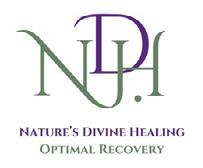
If you have a musical instrument you no longer use, consider donating it to the Farina Foundation. Established in 2015, this nonprofit organization carries on the legacy of Frank J. Farina Jr., a beloved music icon in the North Allegheny area. Through its Play-It Forward program, the foundation aims to provide underprivileged children in the Tri-State region with access to music education by accepting donated instruments. By donating your instrument, you can help these children fulfill their dreams of learning to play an instrument and discovering the joy of music.
The Farina Foundation accepts almost any playable instrument, but they are particularly interested in brass and woodwind instruments. The foundation partners with various organizations, such as the Pennsylvania Music Educators Association, the Children’s Hospital Music Therapy Department, and Goodwill Industries, to distribute the instruments to those who most need them. All donated instruments are repaired and sanitized before distribution, ensuring they are in good condition for the children who receive them. Your kindness can help inspire and nurture the next generation of talented musicians.
To donate your musical instrument, you can drop it off at
Brighton Music Center, which is located at 2110 Babcock Boulevard in Ross Township. For more information on how you can help make
a difference in a child’s life through this excellent program, please visit farinafoundation.org. n


Concerts at McCandless Crossing, 6-8 pm, Mons. & Thurs. through the end of Sept., on the Green (across from BJ’s Restaurant). Bring a lawn chair or a blanket. For a list of performances visit, adventuredev.com/mccandless-crossing.
Concerts in the Park, 7:30 pm Fridays: June 27, Red Baraat; July 5, Pittsburgh Symphony Orchestra (Sat. at 8:15 pm); July 11, American Authors; July 18, Chuck Prophet & His Cumbia Shoes; July 25, Ashley Cooke; Aug. 1, Herman’s Hermits Starring Peter Noone; Aug. 8, Over the Rhine; Aug. 15, Robert Jon & the Wreck; Aug. 22, Pittsburgh Honky Tonk; Aug. 29, Tamburitzans, South Park Amphitheater, 100 Farmshow Drive, South Park Township. For info, visit www.alleghenycounty.us/ Parks-and-Events/Special-Events/SummerConcerts-Series.
Summer Music Series: 4-5:30 pm, Thurs., July 10, Act II: Jazz Trio; July 24, Elizabeth Danko; Aug. 7, The Honky Tonk Heroes; Aug. 21, Felicia Niebel, Ridgecrest Senior Living, 8870 Duncan Ave. For info, visit RidgecrestSeniorLiving.com.
Big Butler Fair, June 27-July 5, Big Butler Fairgrounds, 1127 New Castle Rd., Prospect. For details, visit www.bigbutlerfair.com.
Celebrate Independence Day with Fireworks! For a list of fireworks displays in Allegheny County, visit www.visitpittsburgh.com/blog/celebrate-the-4th-of-julyin-pittsburgh/.
Divine Grace Parish Family Festival, 5-10 pm, Aug. 8 & 9, and 4-9 pm, Aug. 10, St. Ferdinand Church, Cranberry Township.
Live entertainment, nightly dinners, White Elephant sale & rides. To learn more, visit parishfamilyfestival.org.
Little Italy Days, 5-9 pm, Aug. 14; noon9 pm, Aug. 15 & 16; noon-5 pm, Aug. 17, Bloomfield. Italy-themed food, learn to stretch pizza, play bocce, dance with entertainment. For info, visit littleitalydays. com.
Picklesburg, July 11-13, food festival, Blvd of Allies between Stanwix and Smithfield Streets. For details, visit www.picklesburgh.com.
Saint Aidan Festival, July 31, August 1 & 2, at St. Alexis, 10090 Old Perry Hwy, Wexford. Rides, games, entertainment, food, and family fun! For details, visit festival@saintaidanparish.org.
Free Matinee Movies on Mondays: 2 pm, June 23, The Penguin Lessons; June 30, Carry-On; July 7, Joy: The Birth of IVF; July 14, Lee; July 21, Touch; July 28, Widow Clicquot ; Aug. 4, Maria; Aug. 11, Last Breathe; Aug. 18, Back in Action, at the Legacy Theatre at Cumberland Woods Village in McCandless Twp. For details, visit TheLegacyLineup.com.
The Edgeworth Bridge Club is sponsoring POP-UP Bridge game, 2-5 pm, June 29. The games will be hosted by The Lindsay Theater and Cultural Center in their Community Room, 418 Walnut St., Sewickley. For questions, email EdgeworthBridgeClub@gmail.com.
Monroeville Senior Center, 6000 Gateway Campus Blvd., Monroeville. Provides a variety of activities for seniors
ages 50 and older from quilting to book clubs fitness, travel groups. For details, visit monroeville.pa.us or (412) 856-7825.
Wisdom & Wellness Symposiums: Smart Strategies for Aging Well, 8 amnoon, Tues, Sept. 23, Legacy Theatre, 700 Cumberland Woods Dr., McCandless Twp. Call 801-688-0130 to reserve your spot.
Young at Heart 60+ Singles luncheon, 1:30 pm, on the 1st & 3rd Wed., each month in Cranberry Twp. First Wed lunch, Olive Garden & third Wed lunch, Cracker Barrel. To reserve a seat, call (724) 8310798 by Monday the week of the luncheon.
Alzheimer’s Association Helpline for individuals struggling with the disease, their families and caregivers. Visit alz.org/ pa, or call (412) 261-5040 or (800) 2723900.
Caregivers Support Groups are available throughout the month at various days, times and locations in Allegheny County. For a list of meetings, www.alleghenycounty.us/caregivers/support-groups.
Caregivers Support Groups are available through UPMC. For a list of programs, visit www.upmc.com/services/seniors/resources-for-caregivers/caregiver-resources-hub.
Parkinson Foundation of Western Pennsylvania offers various activities for those impacted by Parkinson’s disease. For further info, visit https://pfwpa.org/.
AMERICAN AUTHORS - ASHLEY COOKE - HERMAN'S HERMITS STARRING PETER NOONE - BPM - OVER THE RHINE - THE VINDYS - ROBERT JON & THE WRECK - RED BARAAT - CHUCK PROPHET AND HIS CUMBIA SHOES - JOE GRUSHECKY AND THE HOUSEROCKERS - TAMBURITZANS - PITTSBURGH OPERA - PITTSBURGH HONKY-TONK - PITTSBURGH SYMPHONY ORCHESTRA
SMASH MOUTH - KT TUNSTALL - MAT KEARNEY - THE FAMILY STONE - MO LOWDA & THE HUMBLE - MONTY ALEXANDER - RANDALL BAUMANN - NICK LOWE & LOS STRAITJACKETS - PITTSBURGH BALLET THEATRE - EASY STAR ALL-STARS - THE SKYLINERS - RIVER CITY BRASS - PITTSBURGH SYMPHONY ORCHESTRA
VISIT ALLEGHENYCOUNTY.US/SUMMER FOR MORE INFORMATION, INCLUDING DATES, TIMES, FOOD TRUCK SCHEDULE, AND OPENERS!

This summer only! Travelers can take a
ONLY at the National Aviary. Engaging daily activities, or “In Flight Entertainment” takes you around the world to meet unique birds and hear exciting conservation stories about them! Make it a next-level group experience and add on Passport to Parks, the National Aviary’s brand-new, most immersive bird show to date, where you can travel internationally to national parks with two Aviary guides and see skunks, cranes, and owls closer than ever before!
Book your boarding pass at aviary.org




By Paula Green
I grew up in a home filled with love and companionship. I am the youngest of eight children, with five brothers and two sisters. We always managed to find things to do over the summer. Our local swimming pool was about half a mile away, and on lovely days, we would walk to the pool and spend the entire day there enjoying ourselves. We loved to play Marco Polo, and we looked forward to evenings when our swimming club would offer nighttime swims. When we weren’t swimming at the pool, we would run through the sprinkler in our front yard.
In our backyard, my dad dug out bases, thereby establishing a permanent softball diamond for our enjoyment. As we gathered to form teams, I distinctly recalled the disheartening experience of consistently being the last one selected, but I was small and not any good at the game!
Our neighborhood was a bustling hub of activity, especially during the summer. We’d a vibrant group of kids with whom we’d ride bikes and play games like “Mother May I,” “Red Light Green Light,” “Red Rover,” “Capture the Flag,” hopscotch, and jump rope. Our backyard was equipped with a swing set, sandbox, and a teeter-totter. When we got hot and sweaty in the summer sun, we would turn on the garden hose and get a cold drink of water.
In the evening, we would grab a mason jar, poke plenty of holes in the lid, and catch lightning bugs to put in the jar. It seemed like there was an infinite supply of those buzzing around. By the end of the evening, we would open the jar and set the bright buggers free. It was a real treat when we would get to go to an amusement park. A popular one we often attended, being near our house, was West View Park. The Big Dips and the Racing Whippet were the two major roller coasters. Thoroughfare grocery store sold discount tickets for the park. Another enjoyable road trip was driving up to Conneaut Lake Park. I
remember my dad would also make it a point to stop at Pymatuning on our way. He would purchase loaves of bread, and we would feed it to the carp. We referred to them as “pig fish” because of the way they fought over each other to devour the bread. Once we arrived at Conneaut, we would spend the day riding the Blue Streak, the Scrambler, and the Fun House. We would also spend time in the arcade playing skee ball. Kennywood was always on the hit list for places to attend as well.
Of course, the family liked to venture to take in an occasional Pirate game and watch some of the Buccos greats like Roberto Clemente and Willie Stargell. I remember attending the last Pirates’ game at Forbes Field. We played the Chicago Cubs, and once the game ended, the fans started tearing out seats and the concession stands. It was quite a memory.
Speaking of memories, how many of these summer activities and events did you participate in? There is plenty of summertime left. Have some fun and enjoy the beauty of the season! n



By Paula Green
atrina was just one storm in a record hurricane season that saw 27 named storms, surpassing the record of 21 set in 1933. There were so many tropical storms and hurricanes in the Atlantic that we ran out of names and had to start using the Greek alphabet. Natalee Holloway, 18, became a household name after the Alabama teen vanished while on a class trip to Aruba on May 30. Mark Felt, a 92-year-old retired FBI agent, was revealed to be 1972’s “Deep Throat” who helped take down Richard Nixon’s presidency.

The average income was $55,238. The cost of a new home is $240,900. The average cost for a new car was $14,990. Gasoline was $2.30 a gallon. A loaf of bread was $2.29. A gallon of milk was $3.20, and eggs sold for $1.87 a dozen. Ground beef sold for $3.29 a pound. Heinz Ketchup was $1.39 for a 14-ounce bottle. A first-class stamp was 37¢.
YouTube, the world’s largest video-sharing website, was launched on December 15.
The Michelin Tire Company invented Airing it Out, a wheel without an inflated tire.
Reddit, a social news, web content rating, and discussion website, was introduced.
Microsoft unveiled Xbox 360, a video gaming console for home use.
Apple released the Mac Mini, a tiny form-factor desktop computer. They also introduced the iPod shuffle.

Dan Rather retired from the CBS Evening News, and Ted Koppel retired from ABC’s Nightline.

Condoleezza Rice sworn in as first black female Secretary of State.
Michael Schaivo successfully sued to have his brain-damaged wife Terri’s feeding tube removed.
Robert Blake, star of the 70s detective series Baretta, was acquitted of his wife’s murder in 2005 after a contentious 4-year legal drama. He was, however, found liable by a civil suit brought by his children.
Pope John Paul II died on April 2; German Cardinal Joseph Ratzinger was elected Pope Benedict XVI.

Hong Kong’s Disneyland opened. It is located on Lantau Island and was the first Disney theme park to open in China.
On April 9, Prince Charles and Camilla Parker Bowles wed.
On July 7, London is hit by Islamic terrorist bombings, killing 52 and wounding about 700. It is Britain’s worst attack since World War II.

Academy Award winners: Best Picture: Million Dollar Baby, Best Actor: Jamie Foxx, Best Actress: Hillary Swank. Top movies: Batman Begins, Star Wars Episode III: Revenge of the Sith, Harry Potter and the Goblet of Fire, Walk the Line, Madagscar, Charlie and the Chocolate Factory, Wedding Crashers, Mr. & Mrs. Smith, and War of the Worlds


Popular TV shows: Grey’s Anatomy, Criminal Minds, Supernatural, Doctor Who, The Office, Prison Break, Bones, How I Met Your Mother, Rome, American Dad, My Name is Earl, Ghost Whisperer, NCIS, Boston Legal, The West Wing, Medium, and Numb3rs.
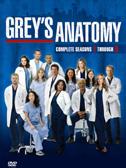
The hit list – We Belong Together, Hollaback Girl, Let Me Love You, Since U Been Gone, Hung Up, Boulevard of Broken Dreams, You’re Beautiful, Don’t Cha, Bad Day, Lonely, Get Right, Behind These Hazel Eyes, Candy Shop, How We Do, Listen to Your Heart, and Feel Good Inc.
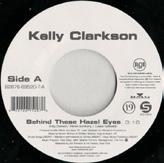

Stephenie Meyer’s vampire novel Twilight was published. Other popular books - On Beauty, Freakonomics, Europe Centra, Harry Potter and the HalfBlood Prince, The Sea, March, Teacher Man, The Year of Magical Thinking, and The Lost Painting: The Search for a Caravaggio Masterpiece.

The New England Patriots defeat the Philadelphia Eagles in Super Bowl XXXIX. NBA – San Antonio Spurs are victorious over the Detroit Pistons. MLB – Chicago White Sox defeat the Houston Astros. NHL the season was canceled due to the 2004–05 NHL lockout.

President: George W. Bush: Vice President: Dick Cheney. On January 20, Bush is officially sworn in for his second term as president.
“I’m the decider.”


We’re seeking friendly, motivated individuals to join our team in a customer-focused retail environment.
Apply today and enjoy these perks:
✔ Competitive Pay.
✔ Flexible Scheduling.
✔ Opportunities To Connect With Your Community.
Whether you’re looking to supplement your income or explore a fulfilling new role, this could be the perfect fit for you.

~George W. Bush
“Our time is limited, so don’t waste it living someone else’s life.”
~Steven Jobs
“Train yourself to let go of everything you fear to lose.”

~ Yoda, Star Wars Episode III: Revenge of the Sith
Sources: www.infoplease.com/year/2005, discover.hubpages.com/education/2005-FunFacts-Trivia-and-History, yearofinvention.com/ top-5-inventions-in-2005/, www.thefactsite. com/year/2005/, www.history.com/a-year-inhistory/2005,www.historycentral.com/21st/2005. html, www.ranker.com/crowdranked-list/best25-movies-of-2005, www.oscars.org/oscars/cer emonies/2005, popculturemadness.com/2005tivia-fun-facts-and-history/














By Paula Green
In our spring issue of Pittsburgh Fifty-Five Plus, we focused on women’s clothing stores that fashionably faltered. This time, it’s the men’s turn. We are going to examine men’s apparel stores that thrived in Pittsburgh, but eventually these stores permanently shuttered their doors.
Fred Hughes and Leslie Hatcher opened their men’s clothing shop in Detroit, Michigan, in 1910 and found instant success. In 1946, Hughes & Hatcher opened their fine apparel store on Wood Street in downtown Pittsburgh. Residents welcomed the expansion into the region, and another store soon followed at the Monroeville Mall. Hughes & Hatcher’s popularity flourished, and at one point, it had 61 stores in six states. By the early 1980s, the store fell on hard times and began closing locations; by 1983,
all Hughes & Hatcher locations had closed.
Robert Hall Men’s Clothing opened in Connecticut in 1937. The store soon expanded nationwide, establishing locations in 36 states. Robert Hall found a home on Penn Avenue in downtown Pittsburgh and also had warehouses on Route 51 in the South Hills and McKeesport. The retailer was known for its inexpensive men’s suits, with no charge for alterations. For forty years, Robert Hall was a mainstay. They filed for bankruptcy in 1977 and sub -
sequently closed their stores.
In 1967, a few salespeople from Melville’s Thom McAn Shoes identified a need in the market for young men’s clothing, which led to the opening of Chess King, which offered trendy fashions. The topselling men’s retailer expanded to over 500 shopping mall locations, including one in Pittsburgh. By the early 1990s, this popular merchant had bottomed out. In 1993, MerryGo-Round acquired Chess King, but Merry-Go-Round itself ultimately filed for bankruptcy in 1994, and all

remaining Chess King stores closed in 1995.



J. Riggings, a men’s clothing retailer, was founded in 1969 and was in several shopping malls in the Pittsburgh region. The store flourished for 18 years, and in 1987, the chain was sold to Edison Brothers. In 1995, Edison Brothers filed for bankruptcy and closed several locations. It then filed for bankruptcy again in 1999, and this time, all remaining J. Riggings stores were closed.
In 1905, Jos. A. Bank emerged as a tailored clothing manufacturing company and evolved into a private-label retailer. Fast forward 68 years to August 1973, when The Men’s Wearhouse was founded. The store’s founder, George Zimmer quipped, “You’re gonna like the way you look; I guarantee it.”
In 2016, Tailored Brands, Inc. acquired Jos. A. Bank and Men’s Wearhouse. When the 2020 pandemic hit, Tailored Brands announced it would close up to 500 stores. Despite these challenges, a few of those stores did close in our area; however, some remain. Ross Park Mall features
stores from Jos. A. Bank and Men’s Wearhouse. These two retailers can also be found in the South Hills and Cranberry Township. Men’s Wearhouse has locations in North Fayette Township and Homestead, showing that these brands are still standing strong.
Although some of these prominent men’s stores have folded up, you can store them in your memory banks. Look ahead; there are plenty of storefronts to shop at, and numerous online options are available as well. From classic brands to trendy boutiques, the world of men’s fashion is at your fingertips. Have fun finding that perfect fit, and happy shopping! n
Sources: 99wfmk.com/hughes-and-hatcher/, www.waterwinterwonderland.com/retaildetail, archive.triblive.com/news/rememberingmerchants-and-advertisements-of-old/, forgottenspots.com/robert-hall-clothes/, www.rpwrhs. org/w/index.Robert_Hall_Clothing_Store, drloihjournal.blogspot.com/2019/06/roberthall-clothes-incorporated.html, finance.yahoo. com/news/men-wearhouse-jos-banks-close, theretronetwork.com/mall-stores-that-youllnever-shop-at-again/, www.tailoredbrands.com/ about/history/
